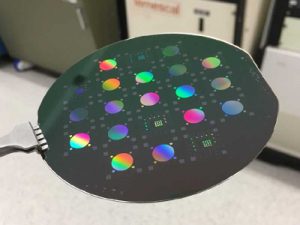“One of the really wonderful things about WNF is how it feels like a community,” says Andy Lingley, a nanofabrication engineer at Modern Electron, a cleantech startup located in Bellevue, Washington. The Washington Nanofabrication Facility (WNF) is a publicly accessible facility at the University of Washington (UW) and is part of the National Nanotechnology Coordinated Infrastructure (NNCI), a network of nanoscale research and development facilities funded by the National Science Foundation. Lingley joined the WNF community in 2007 when he was a new graduate student at UW, and he continued to work with WNF as his career progressed. Lingley offers a unique perspective of WNF as someone who has utilized its nanofabrication capabilities as an academic user, staff scientist, and industrial user.

Lingley first interacted with WNF while conducting research as a graduate student in the lab of electrical and computer engineering affiliate professor, now Amazon vice president, Babak Parviz. Lingley used WNF tools to fabricate contact lenses embedded with sensors or LEDs, which will be adapted for diabetic patients as a non-invasive glucose monitor. “WNF exposed me to a wide variety of microfabrication projects, including solar cells, flexible substrates for electronics, and neural electrodes — all of which require working with different materials and at different size scales,” Lingley recounted. “There was a lot of in-house expertise for each of these applications, and staff and other industrial users interacted with us [graduate students] constantly.”
After finishing his Ph.D. in 2012, Lingley jumped at the opportunity to join WNF full-time. “Almost immediately, I was responsible for several different functions of the cleanroom, including safety, lithography, and etching,” Lingley said. “Working as a staff scientist at WNF allowed me to see even further under the hood, and to understand the equipment and processes well enough to teach graduate students and industrial users.”
In 2015, Lingley started working for Modern Electron. This local startup has received over $10M in venture capital funding to develop advanced thermionic energy converters as cheaper, more reliable, and lightweight alternatives to conventional steam turbines. Thermionic converters capture heat in an “emitter” electrode, raising its temperature to over 1000°C. Hot electrons escape the emitter and flow across a microscale vacuum gap to a cooler “collector” electrode. These collected electrons have enough excess energy to do useful work as electricity in a circuit. As an industrial user, Lingley has used WNF equipment to prototype microstructured silicon electrodes to improve the electron collection process, which allows thermionic converters to surpass historical limitations.
Lingley credits the breadth of experience he gained at WNF for his ability to adapt to and succeed in a startup. “I was given the opportunity to get in on the ground floor with Modern Electron, which is an entirely different environment from performing research or operating the WNF clean room,” Lingley explained. “But, thanks to my time at WNF and my various roles, I came in with a thorough understanding of the semiconductor industry and the technical capabilities of the facility. This has really helped me drive progress at Modern Electron.”

Modern Electron’s technology is very promising, but as is the case for many small energy startups, they lacked the significant capital necessary to purchase their own advanced manufacturing facilities and equipment. WNF supports technology innovation and commercialization, for startups as well as larger and more established companies, by giving them access to specialized equipment and a highly trained workforce. Modern Electron uses a number of different WNF instruments such as a Canon Stepper for photolithography and a SPTS Rapier to etch small, deep holes in silicon wafers.
Modern Electron has also hired two students from the WNF Undergraduate Research Program, which Lingley says is a testament to the quality of students that come out of the program. “WNF has an exceptional cohort of undergraduate employees. It’s so helpful to have them around the lab — they make sure the lab is stocked and all of the equipment is running smoothly. And it’s a great opportunity for the students too, because they get to work on real-world projects and help develop new processes alongside staff scientists. It’s hands-on training to be an engineer.”
The next move for Modern Electron is toward a scaled-up, market-ready product. Even as the company transitions some of its manufacturing to external foundries, Lingley will continue to benefit from his relationship with WNF. “By interacting with other users, I’ve been exposed to the differences between academic and industrial cleanrooms. Scale-up is a fundamental step for a successful startup, and I’m excited to continue with this new challenge.”
